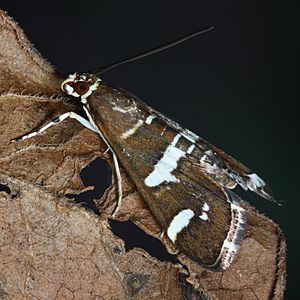Beet webworm moth facts for kids
Quick facts for kids Beet webworm moth |
|
|---|---|
 |
|
| Scientific classification | |
| Kingdom: | |
| Phylum: | |
| Class: | |
| Order: | |
| Family: | |
| Genus: |
Spoladea
|
| Species: |
S. recurvalis
|
| Binomial name | |
| Spoladea recurvalis (Fabricius, 1775)
|
|
| Synonyms | |
|
List
|
|
The beet webworm moth, also known as the Hawaiian beet webworm, is a type of moth found all over the world. It belongs to the Crambidae family. You'll mostly find this moth in warm, tropical places. Its scientific name is Spoladea recurvalis.
Contents
Discover the Beet Webworm Moth
This section will help you learn more about the beet webworm moth. We will look at its size and where it lives.
What Does This Moth Look Like?
The beet webworm moth is quite small. Its wingspan is usually between 22 and 24 millimeters. That's about the length of two small paper clips! These moths fly during certain times of the year. This depends on where they live. For example, in some places, they might fly from May to September.
Where Do Beet Webworm Moths Live?
You can find these moths almost anywhere in the world. However, they are most common in tropical regions. This means they prefer warm climates.
The Life Cycle of the Beet Webworm Moth
Like all moths, the beet webworm moth goes through different stages. It starts as an egg, then becomes a larva (caterpillar), then a pupa, and finally an adult moth.
The Caterpillar Stage
The young beet webworm moths are called larvae or caterpillars. These caterpillars are green. They look a bit like the veins on a leaf. This helps them blend in. They grow to be about 19 millimeters long.
These caterpillars like to eat certain plants. They feed on the underside of leaves. They eat plants like spinach, beet, cotton, maize (corn), and soybean. To stay safe, they spin a thin web over themselves. This web protects them while they eat.
The Pupa Stage
After the caterpillar has grown enough, it changes into a pupa. This is a resting stage. The pupa forms inside a small, light cocoon. This cocoon is often made in a folded piece of leaf. The pupa itself is a very pale brown color. This pupa stage usually lasts for about 12 days. After this time, the adult moth will emerge from the cocoon.
Images for kids
 | Selma Burke |
 | Pauline Powell Burns |
 | Frederick J. Brown |
 | Robert Blackburn |




